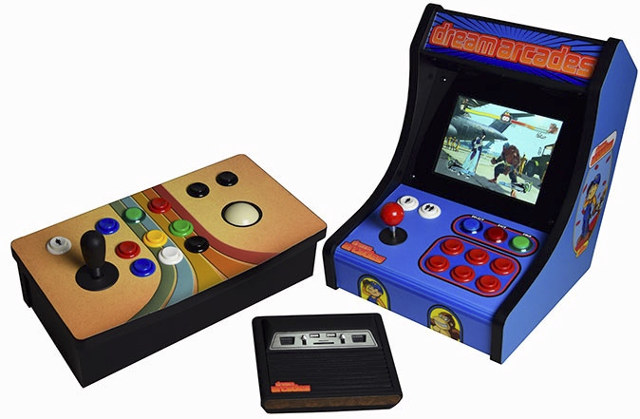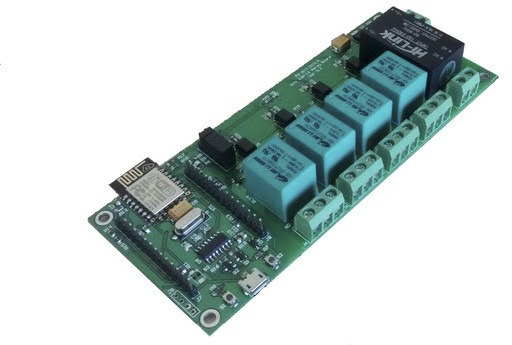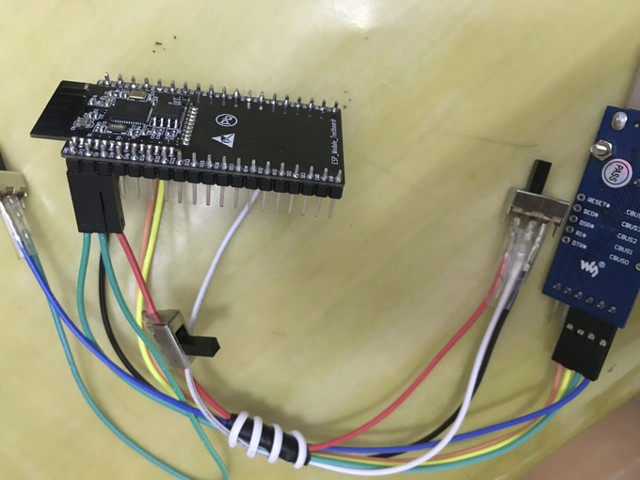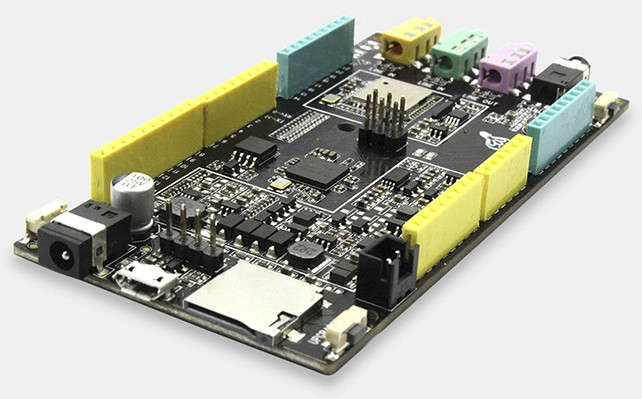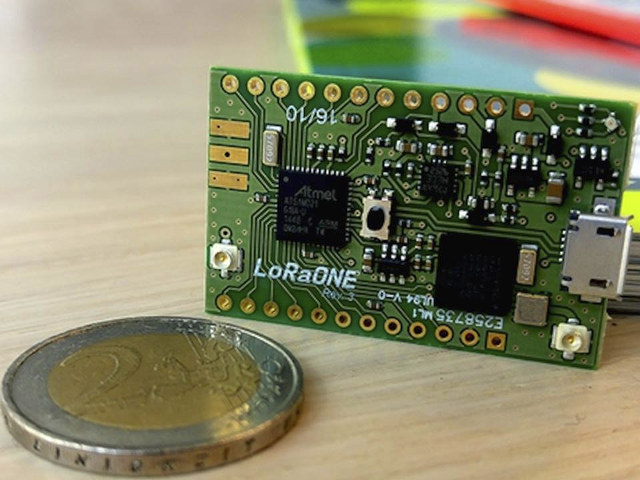If you are old enough to have played with Sega or Atari game console, and feel nostalgic about playing retro games, Dream Arcades Inc. plans to launch a vintage gaming console powered by Intel Braswell or Cherry Trail processor, running Windows 10 and preloaded with licensed retro games such as Pacman, Asteroids, Canyon Bomber, Slot Machine, Warlords, and many other. The console also has Sega/Atari ports to be used with your old game controllers. Three main products will be offered: Wireless Arcade Controller, Replay Classic game console, and Replay Mobile arcade machine, with the last two using the same hardware with the following preliminary specifications: SoC – Intel Atom x7-Z8700 Cherry Trail quad core processor, or Intel Celeron J3160 (or other) Braswell quad core processor with Intel HD graphics System Memory – 4GB Storage – 64GB eMMC flash + micro SD and SD slots Video Output – HDMI Display (Arcade […]
Armtronix AC Powered WiFi Quad Relay Board is Powered by ESP8266 SoC (Crowdfunding)
Armtronix, an Indian startup, has come to kickstarter to launch a quad relay board with an AC terminal based on ESP8266, and the company also offer a complete kit allowing you to build your own wireless power strip with the board. WiFi quad relay board specifications: Wireless module – ESP8266 module 4x Relays to connect four AC/DC loads with terminals offering both MO and NC options “ModeMCU” headers to connect additional sensors such as PIR, IR, Temperature, Humidity, Limit switch etc. USB – micro USB port for programming. Misc – LEDs Power Supply – Terminal with 100-240V AC to 5V DC converter. Dimensions – 145 x 60 x 22 mm. The WiFi Quad Relay Board can be programmed as “MQTT Client” for networking/home automation integration using Arduino IDE, and controlled/ setup with a smartphone running a web browser. Some code is already available on the company’s github account. The crowdfunding […]
Get an Early ESP32 Board by Contributing to Luanode for ESP8266 & ESP32 Project (Crowdfunding)
Development boards and module based on Espressif ESP32 dual core processor with WiFi and Bluetooth LE connectivity are due for Q3 or Q4 2016, but you could get an early sample as early as July if you contribute to Jimmy Wu’s (of wifimcu.com) crowdfunding campaign to develop Luanode (Lua SDK) for ESP8266 and ESP32 processors, as ESP32 boards are part of the rewards. Luanode is a Lua SDK for ESP32 and ESP8266 that supports multi-tasking through FreeRTOS, and includes support for peripherals. The source code and documentation can be already be found on Github, and the main differences against something like NodeMCU appear to be multi-tasking and (for now) ESP32 support. Interestingly the SDK contains a tools called WiFi-Killer uses for Denial of Service (DoS) attacks using ESP8266 or ESP32 modules… One hardware project is called WiFi tank comprised of one T300 Tank Chassis, ESP8266 Development Kit, 720p HD Camera, […]
Fireduino Arduino Compatible Board Features Rockchip RKnanoD Dual Core Cortex-M3 MCU (Crowdfunding)
Rockchip RKNanoD dual core Cortex M3 micro-controller was introduced last year for IoT and audio applications, and the Firefly team, known for their FirePrime or Firefly-RK3288 development boards, has designed an Arduino compatible board based on the MCU with lots of audio ports, Arduino headers, and WiFi connectivity. Fireduino specifications: MCU – Rockchip RKnanoD dual core ARM Cortex M3 MCU @ up to 250 MHz (system core) / 500 MHz (calculate core) with respectively 640 KB and 384 KB RAM Storage – 4 or 8MB SPI flash + micro SD slot Audio 24-bit/192 KHz audio codec (built in MCU) with HW accelerator for APE, FLAC, OGG, and MP3 audio decoding 1x 3.5mm analog audio jack 2x 3.5mm LINE In jacks 1x On-board microphone DLNA wireless audio support Connectivity – 802.11 b/g/n WiFi via Ampak AP6181 module Expansion Arduino header with I2C, SPI, ADC, GPIO, PWM, UART LCD interface (Intel 8080 […]
Pebble 2 & Time 2 Smartwatches, and Pebble Core for Runners and Hackers Launched on Kickstarter
Pebble launched one of the first smartwatches in 2012, and is now one of the most famous name for wearables. The company has now launched another crowdfunding campaign for three wearables: Pebble 2 & Time 2 watches, and Pebble Core which can be either be used as a fitness tracker for runner, or by hardware hacker to play with IoT apps. Pebble 2 and Time 2 can receive notifications from your Android or iOS smartphone, include a built-in HRM for activity tracking, and a microphone for voice record and SMS, and are waterproof of up to 30 meters. To me the two key features of Pebble wearables are always-on displays, and long battery life, and the two new watches have a black & white (Pebble 2) or color (Time 2) always-on display, and up to one week of battery life for Pebble 2, and 10 days for Time 2. Pebble […]
OtterBox uniVERSE Modular Case System & Tapit Customizable Tactile Keyboard Case for Smartphones
Two innovative cases for smartphones have been introduced very recently: OtterBox uniVERSE modular case system which allows you to add various modules in a similar fashion to what Project Ara promises, and Tapit case adding a flexible keyboard on top of your smartphone case. OtterBox uniVERSE modular case system The company offers a protective case for your phone for $50 to $60, and you can add modules as needed from the following selection: Square Contactless & Chip Reader, $49.99 – To accept credit cards and contactless payments on the go olloclip 4-in-1 lens, $79.99 – Fisheye, wide-angle, 10x and 15x lens options SanDisk iXpand Flash Drive, $59.99 to $119.99 – 32GB, 64GB or 128GB of additional capacity Nite Ize Steelie Vent Mount Kit, $39.99 – Mount your smartphone to a vehicle vent for hands-free use Goal Zero Slide Battery, starting at $59.99 – Extra battery Manatee Works StingRay Barcode Scanner, […]
Brixo are LEGO Blocks for IoT and Robotics Applications (Crowdfunding)
Brixo, an Israeli start-up, has designed LEGO compatible blocks – also called Brixo – that conduct electricity, embed sensors, Bluetooth connectivity LED lights, or even motors. You simply use them as any LEGO blocks, but you can control them using light, sound, or your smartphone. There are three type of blocks Connector blocks – Made of chrome and used to connect the trigger blocks to the action blocks. They act like wires. Trigger blocks – They include Bluetooth connectivity, a proximity sensor, a light sensor, or/and a sound sensor Action blocks – LED lights or motors blocks They also have a smart battery block with Bluetooth LE designed for a 9V rectangular battery. Now get some of your existing LEGO accessories, and start having fun. The demo below shows the battery block on the right, some connector blocks, and various triggers and action blocks. You don’t even need any smartphone […]
LoRaONE is a Small LoRa IoT Development Board Based on Atmel SAMD21 MCU, Microchip LoRaWAN Module (Crowdfunding)
While there are many long range LPWAN standards, LoRa appears to be one of the most popular with boards such as LoPy, and now SODAQ LoRaONE module hitting crowdfunding campaigns. LoRaONE is powered by an Atmel Cortex M0+ micro-controller, features Microchip RN2483 or RN2903 LoRaWAN module, GPS, and various sensors. LoRaONE board specifications: MCU- Atmel ATSAMD21G18 ARM Cortex M0+ micro-controller @ 48 MHz with 256 KB flash memory, 32KB SRAM, and up to 16 KB EEPROM (by emulation) Connectivity LoRa via Microchip RN2483 (433/868 MHz) or RN2903 (915 MHz) module depending on your region GPS via u-blox EVA 7M USB – 1x micro USB port for power and programming Expansion headers (unpopulated) 14x digital pin, 12x for analog and 8x for PWM, plus UART, SPI and TWI (I2C) Analog output pin – 10-bit DAC External Interrupts: Available on all pins DC Current per I/O pin: 7 mA Operating Voltage – […]


